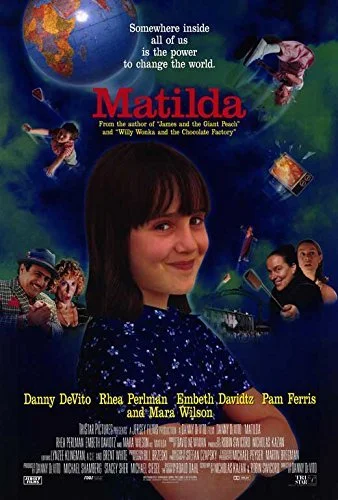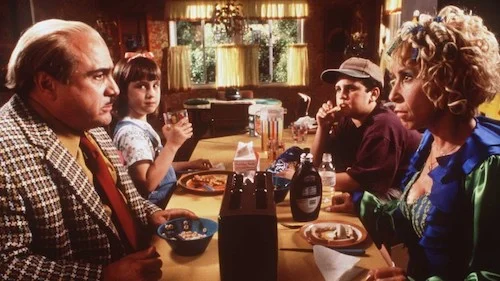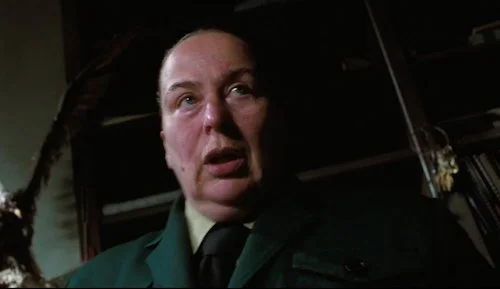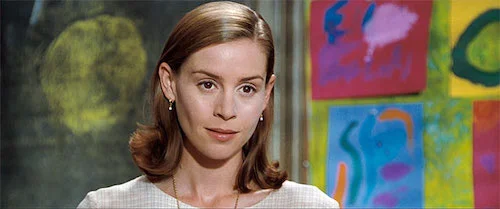National Kids Day: Matilda
As part of National Kids & Pets Day, we decided finding nostalgic childhood films was a bit easier than combining both themes. We are taking this opportunity to review ten films that have been deemed staples of the youths of varying generations. This article looks at Matilda.
If you are my age, Matilda is the main film everyone watched to oblivion when we were kids. Over twenty years later, is it sacrilegious to try and view it as an adult? Should we actually be critiquing this portion of our youths? Nostalgia should not be the main reason why a film is good. That’s interpretational. Sure, all options are based on subjectivity, but there still is an element of theory that should be taken into account with any work: are rules being adhered to, or broken in the correct way?
I bring this idea up for this review (and only this review), because it certainly appears that Danny DeVito truly figured out how to make a film specifically for children, that adults don’t have to agree with (but can still understand). Whether it was DeVito’s film, or the acclaimed Roald Dahl source material (an author who clearly knew the divide between childhood and adulthood), Matilda is a piece geared for youths without being mind numbing.
The titular child away from a mostly hostile world.
For kids, Matilda is a fun, colourful, bonkers tale of sticking it to the world when it’s being too harsh on you. The main character (obviously Matilda Wormwood) has an awful family, an abusive principal, and a misunderstood mind. She wishes to engage in intellectual growth, not settling for vapidness. Her lazy family feels differently, in a vicious enough way that she is a betrayer of the family for not being addicted to television. All of these gross exaggerations are a wonderful lens on the world, as if a child was living the monstrous depictions they were envisioning.
Of course, this film rings a little bit differently as an adult. This is a gifted child being shunned by the rapid-paced industrial world. Illegal scamming can help you get by, but it doesn’t guarantee actual joy. You can complain about being trapped at home all you want, but you also enjoy the luxuries around you enough to not actually change your life. I’m talking about Matilda’s caricature parents (played by real life couple DeVito and Rhea Perlman). Matilda is very smart, and she can pick up on these things (with zero results once she steps in). That’s when she discovers (almost too conveniently) that she has psychic powers. As a child, this is a magical revelation. As an adult watching this film, it’s understanding the ability to make your own choices to change outcomes.
The highly dysfunctional Wormwood family.
Only one adult gives Matilda the proper time of day, and it’s Miss Honey. Honey is frozen in place as an adult: she has to teach by principal Agatha Trunchbull’s rules. That means no colour, no fun, no joy. Everything has to be grey, grim, and headache inducing. If you go against the mold in any way, you are tossed into the “chokey” (a closet full of dangerous sharp objects, that I’m surprised such a conservative headmaster that believes in bare basic educational ethics was obsessed with). So much of this feels smarter than our younger selves gave the film credit for. Miss Trunchbull is the system squashing innovative ideas, because they spit on old, tired ways. Miss Honey is a shining beacon, that feels threatened enough by the establishment to hide her true nature. This, sadly, is adulthood. I’m sure we’ve experienced hierarchal stubbornness, and unappreciated bright eyes many a time.
Miss Trunchbull, continuously being framed with an unflattering, low angle shot.
What doesn’t quite work, is the film’s reliance on its fun to get by. The narrative moves by too quickly. I understand that younger audiences may have shorter attention spans and they may not necessarily want four hour opuses. However, I also believe in longevity. We have a creative story here, especially in regards to its real life parallels. Why do we have to bounce through the whole thing? Matilda never feels overly noisy, but it is definitely a full sprint that never takes a breather. You blink and it is finished. Maybe that’s why we rewatched it a thousand times. It was short enough to fit in any day.
Miss Honey and her colourful classroom.
We could go on about the questionable edits, the over-uses of special lenses, and the hyperactive pacing. I think I said enough in that sentence. Matilda is clearly a private conversation with its child audience about the real world. It does its job. I don’t think there would be any purpose to be overly critical of a film that fulfils its clear focus, despite its cinematic shortcuts. I also don’t want the riot that will be sparked by the handful of readers I have (and the wall built up to prevent this site from ever taking off). Most importantly, I myself hold this film dear in my heart. It’s inoffensive to revisit now, so there’s no point in attacking it. It’s charming, and magical for children. I’d rather lean towards a Miss Honey (and not be an ungrateful traditionalist like Miss Trunchbull), so I’ll leave it at that. Matilda is loving, and it takes its youthful audience seriously in every aspect. Nostalgic viewings will also be a nice vacation back to your past. Just don’t be me and scrutinize it.
Andreas Babiolakis has a Masters degree in Film and Photography Preservation and Collections management from Ryerson University, as well as a Bachelors degree in Cinema Studies from York University. His favourite times of year are the Criterion Collection flash sales and the annual Toronto International Film Festival.








